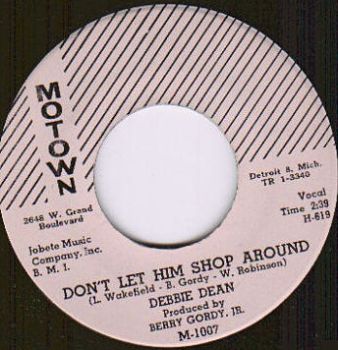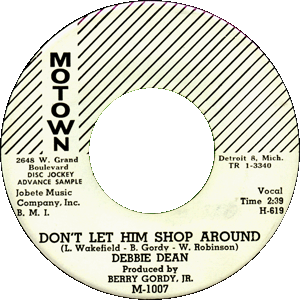Tags
 Motown M 1007 (A), February 1961
Motown M 1007 (A), February 1961
b/w A New Girl
(Written by Loucye Gordy Wakefield, Berry Gordy and Smokey Robinson)
 “Answer records”, eh? Usually an excuse for some talentless chancer to hitch a ride on the coat-tails of a current hit record, often faintly amusing on the first listen and then pointless thereafter, a trope that has produced very few classic records over the last sixty years. Answer records were also a mainstay of Motown in the early days; the most astonishingly egregious example, the Satintones’ Tomorrow And Always, landed Motown with a lawsuit, but there are plenty of other examples in those commercially-uncertain first few years.
“Answer records”, eh? Usually an excuse for some talentless chancer to hitch a ride on the coat-tails of a current hit record, often faintly amusing on the first listen and then pointless thereafter, a trope that has produced very few classic records over the last sixty years. Answer records were also a mainstay of Motown in the early days; the most astonishingly egregious example, the Satintones’ Tomorrow And Always, landed Motown with a lawsuit, but there are plenty of other examples in those commercially-uncertain first few years.
This one is a bit more forgivable. It’s an answer record to one of Motown’s own hits, the Miracles’ Shop Around; the Miracles themselves had got their start years previously with début single Got A Job, an answer to the Silhouettes’ Get A Job, so now the wheel comes full circle. To drive the point home, it’s the actual Miracles themselves doing the backing vocals on this, which is essentially a note-for-note remake of Shop Around with new lyrics.
Slightly better lyrics, too, in fairness; the troubling touch of misogyny from the original is turned on its head here, as while Smokey’s mother advised him to shy away from commitment and play the field, Dean’s mother advises her not to let him try that tactic. It’s still not exactly enlightened – the onus is put on her to keep her man happy, rather than, for instance, him not being a total sleazebag. Initially, it’s unclear why Dean’s mum would even want her daughter to persevere with such an obvious tool in the first place, but there’s a funny twist at the end when Dean’s mother turns out to be dishing out this advice for rather baser reasons, noting Smokey’s character’s wealth and advising her daughter to turn gold digger and snare the financial prize of marrying money. Which is both quite amusing, and also makes both this and Shop Around absolutely fine by me; it was troubling if one half of the couple was deeply in love and the other was looking to trade her in for an upgrade, but if they’re both unpleasantly venal, then for me it somehow means they cancel each other out in a way that makes the whole thing less unpalatable. Odd, that.
 A bit of trivia: this song was masterminded by Loucye Gordy Wakefield, boss of various Motown admin departments and beloved big sister to Berry Gordy. Loucye was the woman whose tragically early death in 1965 prompted Berry Gordy to commission a fitting memorial in the form of the stupendous 1968 multi-artist gospel compilation In Loving Memory, featuring two of the absolute best knockout Motown recordings, Marvin Gaye’s hair-raising His Eye Is On The Sparrow and Gladys Knight and the Pips’ incredible rendition of Just A Closer Walk With Thee.
A bit of trivia: this song was masterminded by Loucye Gordy Wakefield, boss of various Motown admin departments and beloved big sister to Berry Gordy. Loucye was the woman whose tragically early death in 1965 prompted Berry Gordy to commission a fitting memorial in the form of the stupendous 1968 multi-artist gospel compilation In Loving Memory, featuring two of the absolute best knockout Motown recordings, Marvin Gaye’s hair-raising His Eye Is On The Sparrow and Gladys Knight and the Pips’ incredible rendition of Just A Closer Walk With Thee.
A bit more trivia (and you’d think after 53 songs, the “momentous firsts” would be starting to die out a bit by now, but no): Debbie Dean was the first white artist to sign with Motown, and the first white female performer to appear on a Motown single. (Nick and the Jaguars, who had released the surf rock instrumental Ich-i-bon #1 in August 1959, were the first (credited) white performers on a Motown label, but theirs was a one-off deal for Tamla to release that one pre-recorded single, rather than them actually signing a contract with Berry Gordy.)
Debbie Dean was a fine singer, but she was already in her early thirties and rather too old to be a teenybopper idol; the liner notes to The Complete Motown Singles: Volume 1 make the compelling case that signing an older, white female singer showed Gordy was getting serious about his MOR pop crossover ambitions to pick up a middle-class white audience. While Gordy put out a number of sides of genuinely dreadful MOR schlock in the Sixties in the misplaced hope of getting those white sitting-room audiences to lap it up, his ambition for Motown to cross racial and class lines and pretty much end up conquering the world was fulfilled, albeit not in the way he envisioned. Maybe this is an interesting place to pinpoint the start of that trend.
MOTOWN JUNKIES VERDICT
(I’ve had MY say, now it’s your turn. Agree? Disagree? Leave a comment, or click the thumbs at the bottom there. Dissent is encouraged!)
You’re reading Motown Junkies, an attempt to review every Motown A- and B-side ever released. Click on the “previous” and “next” buttons below to go back and forth through the catalogue, or visit the Master Index for a full list of reviews so far.
(Or maybe you’re only interested in Debbie Dean? Click for more.)
 |
 |
| Jimmy Ruffin “Heart” |
Debbie Dean “A New Girl” |


Excellent article! You have certainly done your homework about Debbie and the song, especially about the Miracles providing the background vocals.
LikeLike
Thank you 🙂 Just so as I’m not taking credit for someone else’s research, the information about the Miracles themselves doing the backing vocals is from the liner notes to The Complete Motown Singles: Volume 1 box set by Bill Dahl and Keith Hughes. I pretty much treat the liner notes as the word of God for factual trivia about a given record, unless there seems to be significant reason to depart from their version of events.
Debbie Dean is underrated; unfortunately, I won’t get round to her greatest achievement, her return to Motown in 1968 with Why Am I Loving You, for a couple of years at this rate…
LikeLike
Correct email address.
LikeLike
Yes, I have “Why Am I Loving You. Thank you for your cmments, and work.
LikeLike
Don’t know if anyone’s still reading this, but after hearing the utterly phenomenal Baby Baby I’m In Love Again from the A Cellarful of Motown: Volume 2 CD compilation, I think I should make it clear I was totally wrong in the comment above, because Baby Baby I’m In Love Again is clearly Debbie Dean’s greatest achievement. I love it.
LikeLike
My Dad Mike Edwards, from Crbin, Ky had a big band in the 30’s 40′. He settled down to raise a family& opened a night spot outside of Corbin, Ky he gave her, her 1 st start as a singer in his Band. Reba Smith then encouraged my brother Gary Edwards who was very shy, to go after his dreams started him singing at a very young age. He had a successful career traveling the world with his on band. Mike’s brother Gene Edwards was also in his band. Daddy encouraged Reba to go after her dreams, & had a wonderful talent to know teach and encourage her. You are forgetting the songs she wrote, & co wrote and their sucess. Mike had his children when he was 45. So for the time from a small town in Corbin, Kentucky there was a lot of talent.
LikeLike
Thanks Barbara! Do check out the review of the B-side, where there’s much more biographical information on Debbie.
She did great things as a writer and performer, but “Baby Baby I’m In Love Again” is just phenomenal and I stand by my assessment of it as her greatest achievement.
LikeLike
Wow! This is so interesting to me. I live just a few minutes north of Corbin in London, KY! Going to hit YouTube and track down some more of her records!
LikeLike
Going back and catching up on some of your great on-point observations on all things Motown. Reading this comment you made about “Baby Baby I’m In Love Again,” I thought, BULL’S EYE! The more we hear Motown’s vault material, the more I keep wondering why a lot of what seemed to be very strong material was left behind. With this song, Debbie found the perfect marriage between her country-tinged vocals and Motown’s soulful pop sound. I would have to say, I think you’re right about the greatest achievement designation. If nothing else, it’s a very close tie with “Why Am I Loving You Baby” https://youtu.be/szlsfGuAfUk
LikeLike
Berry’s work relationship with Debbie Dean started in 1958, when he wrote songs for her and her group, Penny & The Ekkos (Argo Records). She was Penny.
LikeLike
Mmhm, I can’t remember why (I wrote this months ago) but I put most of the biographical trivia on “Debbie” on the B-side page instead – I usually put biographical information on the A-side reviews, I don’t know why I did it differently here. Anyway, there’s a potted mini-resumé for her scattered around that page!
LikeLike
i wanna know more of Loucye Gordy Wakefield and her short life and career you hear more of the others but not too much about her.
LikeLike
One of the best independent sources for information about Loucye’s life is Nelson George’s Where Did Our Love Go, which dedicates a great deal of print in its early stages to the background of the Gordy family (going back to Berry Gordy’s grandfather). She was moderately successful in business in her own right well before Motown was founded, establishing a riding school and working for the Army as what we Brits would call a quartermaster; she later headed the fledgling billing and collection department at Motown in the very early years, Barney Ales was hired as a kind of assistant to her and she’d look after the bookkeeping; Berry credited her on more than one occasion with keeping Motown solvent in the early years by balancing the books properly, something that was the downfall of many small black businesses at the time. She was made a VP of the company and picked up a few songwriting credits, but her main job was in accounts. She married sax player Ron Wakefield, and died in 1965; Motown honoured her memory with a series of memorial initiatives including annual charity balls and a business scholarship foundation, but the most lasting legacy is the album In Loving Memory, a great record which has several prominent Motown artists (and a few less famous ones) covering their favourite gospel songs and hymns.
LikeLike
Pingback: What Time Is It Again? | The Hits Just Keep On Comin'
I’v e listened to this track several times over the years, trying to give it a fair shake. I just can’t get into ti. To be the answer song to a great record like “shop Around,” it’ just doesn’t cut it. It’s not the worst thing Motown released but it’s not exciting at all.
My rating: 5/10
LikeLike
I love the humor here Mr. Nixon! Great review to read. I think Debbie did a good job on the answer song and I also love the very funny ending.
LikeLike
Dont Let Him Shop Around is very interesting to me. At first i couldnt stand it but this really is a fun song. It is funny that she was 33 trying to sound 17 lol. The song even charted at #92. It’s nice!
LikeLike
Lou if you check this contact me, please!
LikeLike
I like the song, and knew her well. My Dad Mike Edwards gave her and helped her get her start in music in his Big Band as a singer.
LikeLike
The exception that proves the rule on “songs written to order” is Goffin-King’s “Natural Woman” was one of them. Wexler wanted a song using that phrase and challenged them and another songwriting team to pen the “answer” and Goffin & King struck first, and this is one case where Goffin’s contribution is equal to that of his “better half”.
I think the basic concept of using an existing song as the inspiration for a new one is a valid way to jog one’s creativity and it runs rampant throughout the greatest songs of the Beatles, Costello and of course Motown itself (to say nothing of classical music). The trick is to make something new and better from the original germ. The trouble with these early answer tracks is that they add nothing new musically. With the best ones, you often don’t realize they’re answers until the composer admits it years later in an interview. The most densely-packed storehouses of classics created in this way are Rubber Soul and Get Happy, in which nearly every song grows in some way from a Motown seed.
LikeLike
All that said, I think this particular track is not so much an answer song as simply a very clever gender-inversion.
LikeLike
no one’s mentioned this as far as I know so I will…..Debbie ( under the name of Debbie Stevens) was on two shows of the ill-fated Winter Dance Party– one with Buddy Holly , Ritchie Valens and The Big Bopper, and one after they had been killed in the plane crash.
LikeLike
I agree that it’s just good enough as an answer record to Motown’s first knockout punch — by the usual standard of judgment, that is.
However, this thread overlooks the elephant in the living room that made me squeal with delight. The two records taken together ro that mother of a white girl who clearly sounds “country,” not to put too fine a point on it, implicitly blesses her union with a Black boyfriend. Her only concern is that she doesn’t let
LikeLike
… him play the field as men inevitably do — and to make sure he brings him the bacon! Not impossible, but a ripe fantasy for 1961. As a biracial Black man from the South, I approve. The record probably terrified more than a few households. And it was a pretty gutsy move by Berry. The label’s success almost entirely rode on the Miracles, and if poorly received the prank could have conceivably destroyed Hitsville, USA as soon as it had begun.
LikeLike
What makes this record most notable, to me, is its progressiveness. It suggests that in 1961, the mom of an audibly southern white girl implicitly blesses her dating Smokey, so long as she doesn’t let him get away with the usual macho shenanigans — and brings home plenty of bacon. As a biracial southern Black man of a certain age, I approve!
This was a pretty gutsy move by Berry and Smokey. Perhaps they were trying to send a message as the civil rights era was shifting into high gear. That said, this was basically a prank that, if backfired, might have rung down the curtain on Hitsville USA almost as soon as it had begun.
LikeLike